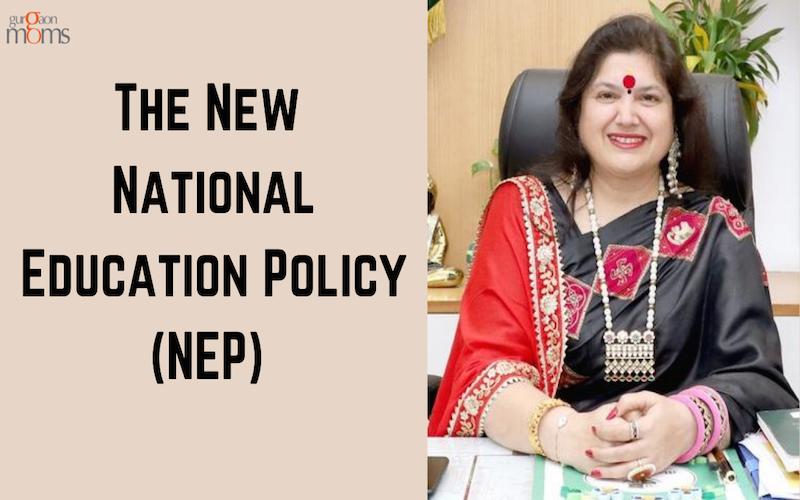‘Education is not the answer to the question, education is the means to the answer to all the questions.’– said William Allin.
The NEP is a monumental step to instill the true value of education i.e. the ability and the freedom to ‘think’-a skill unique to the human species. It is a welcome change as it will not just enable our minds to think but our hearts to experience the joy in learning resulting in a marvelous and enriching experience for young minds. It parts ways from rote learning to experiential learning and from mere content-heavy syllabus to self-paced study. It empowers us with the freedom to choose and suit learning to our unique individual genetic blueprint. Be it the freedom to choose subjects at high school to the level of the subject to the number of years at the higher education marked by multiple exit options.
“First there is emotion; after that comes cognition,” said Frank Thissen.
Research proves that positive emotions tend to help us remember more complex things. The focus on a multidisciplinary approach, art, and life skill integration within the curriculum ensures the holistic development of young minds and caters to the emotional eligibility to better learning.
Perhaps the biggest highlight of the NEP is that schools will now offer integrated learning, right from nursery and KG to middle and high school. NEP in this regard is nothing less than a paradigm shift. It can be seen as the bedrock of joyful, engaged, motivated, and purposeful learning. It is a weapon to integrate emotion with cognition. As ‘Whatever is pleasurable, will be learned’, Studies suggest that happiness can influence academic success. That emotions significantly influence students learning strategies, cognitive resources, motivation, and academic achievement. NEP is the answer and it will promote happiness in learning.
Most of the points highlighted in the New Education Policy 2020 are very good. The policy proposes positive provisions including the long-overdue focus on early childhood education, universalize secondary education, focus on education in the mother tongue (pedagogical research has established beyond doubt that children learn best if they learn in their mother tongue in the primary classes), a credit bank, a record of students’ academic credits, making universities multi-disciplinary and also does away with multiple regulators reducing duplication of work rather simplifying it by replacing it by a single regulator. It proposes beautiful combinations from which students can choose, focus on vocational training and skill-building will guarantee phenomenal results in skilling. Another magical input is that of Self-assessment, Peer-assessment, and Teacher- assessment, it will shift assessment from linear to a 360-degree view to facilitate overall development. Along with several other remarkable gems, the one that outshines is for sure the importance given to Indian ethos, traditional knowledge, wisdom, philosophies, idealism, lives of unsung heroes that for sure will strengthen our roots of existence. All of which is a welcome change.
NEP is powerful as it deconstructs the centuries-old pattern of education to reconstruct the new path to education that focuses on integration rather than segregation.
It lifts up education from the shackles of systems and affordability, it amalgamates best practices from several boards and makes education uniform for all.
Spotlight on ‘Minimum Level of Learning’ (MLL) and making it a prerequisite is another way in which NPE diminishes the deeply etched divisions in education. An ace strategy for improving the quality of elementary education is an attempt to combine quality with equity. It ensures access to education irrespective of differences. It is unifying in nature.
Such a drift from the usual pattern indeed demands colossal and dedicated efforts from all the stakeholders i.e. the Government, schools, parents, and students. It is time we brace up to handhold each other firmly and with confidence to achieve the successful implementation of the NEP. As all good things take time to flourish, implementation of NEP is also going to be a gradual process but a sure shot success if dealt with remarkable willingness, allegiance to the new way, and patience.
It calls to move away from the obsession of assessments and be gratified with holistic learning and experience.
To get accustomed to a new report card that just doesn’t measure learning through the lenses of numbers. It calls for unlearning and relearning for one and all.
Unlearn and relearn is going to be a much-desired skill, especially for our educators. Teachers will be required to gear up to the new way of teaching and communication. This indeed calls for consistent handholding through a series of training. Changes in the pattern of B.Ed also confirm the grooming and training of able and expert teachers, mentors, and coaches. It throws a humongous challenge on schools to beautifully implement the changes. Looking at the magnanimity this is going to be challenging but a challenge worth taking up as it will lay the foundations for our students and the future generations to come.
NEP – A phenomenal step, unanimously welcomed by one and all. Enthused with enthusiasm educators are committed to leave no stone unturned in ensuring effective implementation. Undoubtedly, a catchment for diverse intelligence, skills, and abilities – a step to fix the long due problem of ‘brain-drain’. It gives us an opportunity to make learning willful rather than forceful; to unify the divided; to move from segregation to integration; from dutiful learning to joyful and purposeful learning; to acknowledge and accept individual differences and facilitate each child to be his/her best version; to tirelessly work together, evolve and paint rainbows full of hope, joy, happiness, freedom, skill, and knowledge; to sow the seeds in time to be able to accept changes in the times to come by skilling and upskilling both students and teachers right from the roots i.e. ‘school’ and make them adept in 21st-century skills and make them ‘Future Fit.’ Together we stand in spirit and commitment. Welcome NEP.
This article has been authored by
Dr. Neeti C. Kaushik: Principal & Director, Mount Olympus School, Malibu Towne, Sector 47-Gurugram





